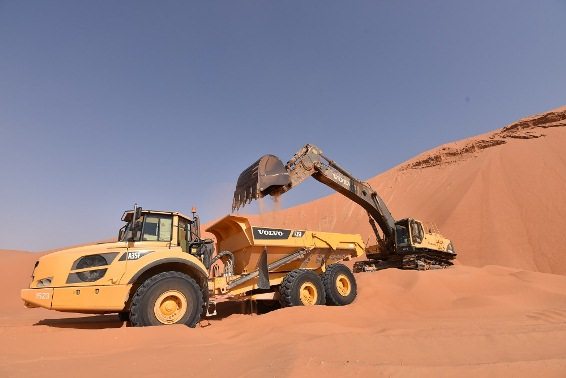Arabia builds first road through world’s largest desert
The first ever highway that directly connects Saudi Arabia and Oman through the Rub’ al Khali desert is now complete! The road, which snakes through the world’s largest desert will now make it easy for travelers and business people moving between the two countries: the Kingdom of Saudi Arabia, which for a long time has been barred from access to Sultanate of Oman by the so called The Empty Quarter or the ‘quarter of emptiness’ desert, is now connected to avoid the longer road through UAE.
The highway will dramatically cut down the journey times and distances between the two. The road will run from Shaybah Oil Field owned by Saudi Aramco to the Saudi-Oman border. 160km will be in Oman while 519km will be on the Saudi Arabia side.
The desert is characterized with steep terrain and sand dunes elevated as high as 250 meters (820ft), and this did not hinder the completion of the road construction project. Among other difficulties, the workers and machines had to cope with extreme desert temperatures, reaching 50oC degrees in the day and dropping to below 1oC at night.
The project
Among the contractors hired for the highway project was the Al-Rosan Contracting – hired in 2010 to undertake the road project, in a journey that would involve construction of 519 km-long highway. Al-Rosan was to build 256 km of single-lane carriage, but comprising of sections with steep inclines where it was to add secondary lanes to accommodate trucks and slow traffic. This section was built using Volvo Construction Equipment (Volvo CE) machines. The Oman side has already been completed. Muhammad Ajanji, the Marketing Manager from Al-Futtaim Auto & Machinery Co. LLC said they had completed the section they were hired to complete had been completed.
Intense heat, farness from nearest inhabited city, shifting sand dunes and harsh topography and climate, all spelt the difficulties in the construction project. Sand bridges across salt flats and high rising dunes were part of the construction works as well as moving large masses of sand. Part of the greatest task was to ensure good machines were selected to cope with the challenges:
“Al-Rosan Contracting selected FAMCO (Al-Futtaim Auto & Machinery Co. LLC), as its equipment partner because of our reputation, the quality of our products and the continuous technical and logistical support that we provide,” says Amal Almizyen, managing director at FAMCO – Saudi Arabia – the exclusive distributor of Volvo Construction Equipment machines in United Arab Emirates and Kingdom of Saudi Arabia.
The company needed to move 130 million cubic meters of sand for bridge construction. This is equivalent to 26 giant pyramids. They also needed 12 million cubic metric of material to prevent embankment of sand from wind and water.
95 Volvo machines comprising of articulated haulers, excavators and motor graders were ordered. The dunes were tackled by a lead excavation team as project progressed, and this was crucial to excavation and building a rased surface and foundations for the road.
About 600 workers comprising of drivers, excavator operators, technicians and others worked on the project for three years. Self-contained camps were specially built with needed facilities for these workers. Relentless working of the machines and 14-hour shifts of excavating and depositing sand and compacting the same using natural salty water would see the team accomplish the dream project within the time frames.
The team at the project has to be changed regularly according to officials due to extreme weather conditions. “Living here is difficult; we change teams every 15 days because few can survive the harsh conditions for lengthier periods of time,” the official said.
Already as of February this year, 21mn cubic metres of sand having been excavated, transported and compacted, with 8 months of construction remaining. The contractors have deployed 10mn cubic meters to support the sand. The whole project is now expected to be complete in June this year.
Much expected even after completion
Driving through a road with no stations and non-inhibited areas may mean trouble in case of situations of car breakdown: thus, it is expected that a lot will be done along the upcoming highway such as developing fueling stations, spare part and repair stations and manning stations. The contractor for the highway must also man the highway for one year after construction is complete, according to contract terms. This will be crucial to moving the shifting sand. The stakeholders will also be required to provide spare parts for the vehicles plying the new route.
Oman has also signed a contract with the project developer Galfar Engineering and Contracting, to construct a border passage complex at the border but on its side, in a move that will see the two countries increase trade volumes and facilitate movement of people.

Leave a Reply